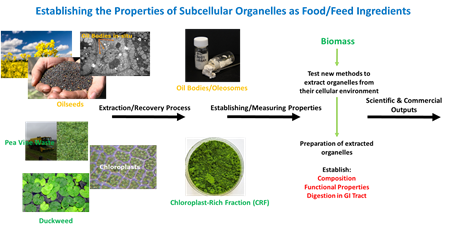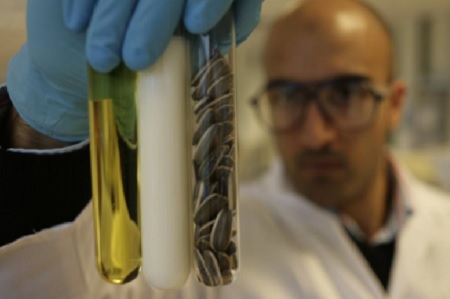At the heart of our research group activity is a biomaterials approach to sustainable nutrition and ingredients.
Professor David Gray and his team have developed methods to isolate/recover lipid-rich organelles from plant material as functional ingredients for food or feed. This area of work not only has potential impact (social/health/developing world, and commercial benefits), it is of fundamental scientific interest.

Oleosomes (oil bodies) act as an energy store when oilseeds germinate. Their microstructure is lost during conventional oil extraction using organic solvents or high pressure crushing. Intact oleosomes can be recovered from oilseeds; ex-vivo (removed/isolated from their cellular environment) oleosomes disperse in water to form stable emulsions. Professor Gray's research group probes the physico-chemical nature of these micron-sized lipid droplets. For example, they carry oil rich in essential fatty acids and lipophilic micronutrients, and the natural amphiphilic coat that surrounds the oil protects it against oxidation. Professor Gray and his research group are also interested in how we digest these natural lipid droplets compared with processed emulsions.

Chloroplasts are organelles, ubiquitous in the biosphere, which convert sunlight energy into chemical energy. Professor Gray's group has demonstrated that most of the nutrients in green plant material are concentrated in the chloroplast: omega-3 fatty acids; β-carotene (pro-vitamin A); lutein; tocopherol (vitamin E); phylloquinone (vitamin k1); ascorbic acid (vitamin C); iron; and manganese. Waste/underutilised green biomass is therefore an untapped source of this cocktail of nutrients which can be 'extracted' by simply removing chloroplasts. Professor Gray has developed a physical process to isolate/recover intact chloroplasts on a large scale. Such liberated and concentrated chloroplasts deliver more nutrients to the consumer than cell-bound chloroplasts since their digestion is not impeded by the cell wall. Professor Gray is also investigating the role of chloroplast microstructure in the release of nutrients during digestion (bioaccessibility).
Who we work with
Sources of funding for this work include: BBSRC. EPSRC, Defra, Charitable Trusts, and Industry
Examples of external academic collaborators include: CNRS Marseille, France; University of Wageningen (Netherlands); University of Massachusetts (USA); Rothamsted Research International; University of York; University of Loughborough; Quadram Institute, Norwich; Kings College London; University of Manchester; University of Bath.
Contact us
You can read more about the team and our research, and get in touch with us via the email links on this page.
To find out more about how we work with business, please contact Mita Lad, Senior Executive in our Corporate Partnerships team - mita.lad@nottingham.ac.uk